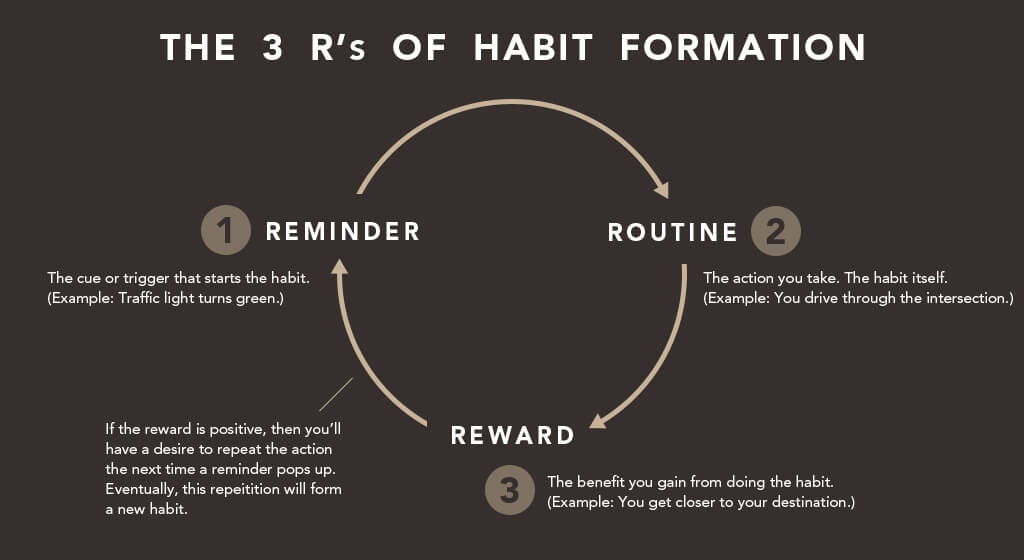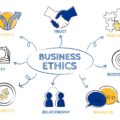What are the entrepreneurial habits? 7 habits of successful entrepreneurs
It’s fine to do the same things every day as long as your routines encourage you to be your most productive and healthy self. However, many people do not assess how they spend their time to see if their routines are beneficial or detrimental to progressing to the next level. High achievers, on the other hand, recognize the need of being intentional with every aspect of their day. Here are the easy daily practices that nearly three dozen successful entrepreneurs and professionals follow in order to perform at their peak.

Here are the simple daily habits nearly three dozen successful entrepreneurs and executives rely on to be at their very best.
1. Use the Golden Rule.
“I am a big fan of taking the everything I learned in kindergarten approach to your day: 1) play fair, 2) clean up your own mess and 3) live a balanced life, meaning learn some, think some, and draw, paint, sing, dance, play and work every day. The most important lesson, treat others how you would like to be treated.”
–John Beaver, EVP and CFO of Biolase, Inc., a dental laser company which has sold more than 38,200 lasers in over 90 countries
2. Stop multi-tasking.
“There are a million things that we want to accomplish each day. However, multi-tasking doesn’t really help us get anything done to its fullest extent. Instead, each day I focus on compartmentalizing different streams of thought or activity to help reduce the transition time between the many things I need to get done. Visualizing and setting mental goals for the day, week, month and even several months and then creating deadlines… helps to make progress on multiple fronts each day. Finally, I make sure to enjoy the journey with a smile and define productivity to include relaxation and time for myself to help keep the engine running smoothly.”
–Vinita Venkatesh, VP of product marketing for Mya Systems, the creator of conversational AI recruiter Mya, named to CB Insights 2018 AI 100 List
3. Take time to be mindful.
“This can be reading, meditating [or] praying. Take these moments to be thankful for all we have and it can serve as fuel to move you forward.”
–Eyal Barad, cofounder and CEO of Cannabics Pharmaceuticals, a U.S public company developing a platform leveraging novel drug-screening tools and AI to create cannabinoid-based therapies for cancer that are precise to a patient’s profile
4. Get out of the comfort zone.
“No matter how busy I get, I practice flow daily. Flow means different things to everyone, but for me, flow is being deeply immersed in an activity to the extent that all mental chatter disappears, and I stop having self-referential thoughts… If I am able to get flow in the first one to two hours of the day, what follows is more potent, and gets me in the zone for the rest of the day. Weekly, I stretch every dimension of myself; whether it’s moving powerfully and fast or slow and mindful, engaging deeply with friends, making love, dancing, or stretching my body in yoga. Doing this overtime keeps my thinking from becoming too one dimensional. Monthly, I aim to push my limits and do something that scares me. I truly believe this to be the only way to experience exponential growth. Overall, the advice I credit with making me most productive is to know when you need help, and ask for it.”

–Chris Aimone, cofounder and CTO of Interaxon, a consumer neurotech company with $28.2 million in funding and the creator of Muse, a brain-sensing meditation headband with hundreds of thousands of users and millions of meditation sessions to date
5. Eliminate chaos by staying proactively organized.
“The CEO of the home is the person who spends more time worrying about everyone else’s needs than their own. It took me a long time to realize it, but the most meaningful moment for me every day is when I can take some of that mental load and anxiety off my wife’s plate. So if I organize my day ahead of time, I’m also making sure she isn’t scrambling to help me when it’s already too late. I use technology as a tool so I know if I have all my essentials for the day with me before I need to walk out the door, and I’m teaching my children to use these same tools so we can keep the entire family chaos-free.”
–Nate Kelly, CEO of Adero, a new tracking technology brand born from what used to be TrackR which recently received $10 million in funding
6. Keep score of how often you say thank you.
“A while back, I recognized the need to give positive reinforcement more often, and I came up with a goofy system to help. Each morning, I put three poker chips on my desk, removing one each time I delivered positive feedback to a colleague. At first, there were days 6 p.m. would roll around and all three chips would still be out. A few days of this embarrassing, visual kick-in-the-pants made me hyperaware of the fact that I’d gone entire days without saying something positive about someone’s performance. This daily habit had the desired impact, and within weeks my behavior improved, and the chips were gone by the afternoon–sometimes the morning. Now I’m so practiced, I don’t need the chips at all, but mentally keeping score helps me remember to keep doling out meaningful reinforcement.”
–Rob Waldron, CEO of Curriculum Associates, a K-12 education technology company providing instructional and assessment materials which serve more than 7 million students and 300,000 educators nationwide
7. Act with agility and simplicity.
“Our world is becoming more and more complex with new technologies and digital resources at our fingertips but what I’ve found to be the most helpful is simplifying how we communicate with team members in order to drive meaningful change and innovation. We follow what is called a small tent strategy where we encourage working in small groups which helps us to make decisions quickly. As an entrepreneur, I know the importance of keeping things as simple as possible, not only to stay agile but to keep improving and transforming our business quickly.”

–Laurent Uberti, cofounder, president and CEO of Sitel Group, a nearly $2 billion global company with 75,000 employees across 27 countries dedicated to customer experience management for its 400-plus clients around the world
8. Own your schedule.
“I truly believe that if one is not in control of their schedule and priorities, then others will determine what it should be and what they decide might not be very pleasant. So, whether it is your meeting calendar, daily or weekly goals, projects, or your weekend plans, if you are not taking charge of them then either you will have to accept what is being planned on your behalf or get frustrated. This doesn’t mean that you should have disregard for input, but I believe that you should take ownership and proactive action. Success comes to those who do not just plan well but execute with the same rigor.”
–Monu Kalsi, VP of marketing for Stericycle where he directs all aspects of marketing, digital, brand, and analytics for a $3 billion B2B services business in North America
9. Slow down to wake up.
“The technology around us is accelerating at breakneck speed, but that doesn’t mean we should be influenced by its collective pressure and move at a similar pace. There are, of course, times when we need to go heads-down and hustle to meet tight deadlines. But more important, I believe, are those times when we intentionally slow down, whether to reflect on lessons from a recent project or to look ahead to prepare for the future. Because my default is hustle, I carve out blocks of time each week for focused but relaxed thinking.”
–Cameron Conaway, director of marketing communications at Solace, an advanced event broker technology company that’s moving data for six out of the 10 world’s largest investment banks and helping to connect over 450 million citizens in India
10. Find your creativity.
“In the tech industry, what often sets people apart is their level of creativity. Therefore, every morning I do two things that help me think in a more creative, fresh way. First I exercise, which for me is very meditative and helps me reset for the day. Afterward, my attention and concentration are heightened which goes in hand with my second-morning habit, reading business-related books and articles with my breakfast. I find that these readings help me find new concepts that inspire me and also help me think through ideas in new and different ways. These habits provide me with a little extra motivational boost that has helped me grow and has made me into a more effective leader.”
–Arvind Raichur, CEO of MrOwl, a Community Interest Engine that has gone from just a few thousand users to more than 400,000 and is averaging over one million mobile sessions a month
11. Write it down.
“I am a list maker and note taker. I have a new notebook that I start every month, and I always have it with me. I use it for making notes in meetings. But I also like to capture ideas when they come to me, inspirations or phrases from others, and of course, the to-do lists. I find that when I write something down, I tend to remember it in a lot more detail than if I jotted a note in my phone or on my computer. For me, there is something about the act of writing that makes it stick with me. Every few days I will look back at my notes and lists, and make new, updated lists. I love crossing things of the list, too. It’s a very satisfying part of the process.”

–Deborah Conrad, chief marketing officer at Grand Rounds, a healthcare navigation tool that connects more than 4.2 million people to high-quality care
12. Have a dog in your office.
“We have welcomed Tobias, a rescue Pomeranian, as an office companion for years. Now more employees have realized the emotional and health benefits of having a canine companion at work. This not only helps the dog and its owner mental and physical health but also everyone in the workplace. Meetings, office visits and the workday are all brightened by our furry friends.”
–Dr. Art Papier, founder and CEO of VisualDx, a diagnostic clinical decision support system that has become the standard electronic resource at more than half of U.S. medical schools and more than 1,500 hospitals and institutions nationwide
13. Start your day reading an actual newspaper.
“While I consume the majority of media and information throughout the day online, I always start my day by reading the physical newspaper for at least 15 minutes. My career in e-commerce is fast, mobile-centric, and often hectic, so I cherish this time absorbing the news without the added distraction of videos, advertisements, clickbait articles, etc. that comes with digital media. This daily practice allows me to begin the day with a clear head before tackling challenges at work and home.”
–Sree Menon, SVP of strategy at Tophatter, an entertaining mobile shopping marketplace with 25 million shoppers and thousands of ecommerce sellers around the world
14. Set a routine and stick to it.
“Whether I’m traveling or in the office, I always try to stick to a routine that keeps me focused and allows me to engage in the things I love. When I’m home, my routine is to wake up, take my longevity supplements, get a cup coffee and enjoy my daughter as much as I can before she goes to school. After a day at the office, I cap off my day with a 20 kilometer mountain bike to keep me active and clear my head to be fully there when I’m home and not still in the office. Keeping a routine when travelling can be challenging, so when I do travel my only routine is to find the place that cooks the best eggs royale in town, so far the best place is in Paris.”
–Claudio Erba, CEO of Docebo, an AI-enabled learning platform company used by more than 6 million people at 1,500 organizations in over 90 countries
15. Clock quiet time with your kids early in the morning.
“I have two young boys and they like to wake up super early, like 5 a.m. I wouldn’t be awake then by choice. But I love having quiet time with them every morning and we spend about 20 minutes reading books together. Family is really important to me and that time in the morning really helps put things in perspective.”
–Adam Erlebacher, cofounder and CEO of Fabric, a company focused on helping new parents secure a financial future, with over $12 million in funding and tens of thousands of customers
16. Walk around with your head up.
“We walk through life with our heads down, busy and engaged. I like to watch for things to appreciate both natural and man-made. It builds an appreciation for the wonder of this world and the creativity of people doing good work. It is humbling, encouraging and centering for me. Look up!”

–Jeff Gilbert, cofounder and CEO of SEP, a software product design and development firm serving clients ranging from Fortune 100 to scale-up companies
17. Focus on one goal.
“An avid participant in IRONMAN triathlons, I’m required to wake up early to train during the week. Instead of letting my focus wander, I identify and focus one Wildly Important Goal (The 4 Disciplines of Execution by Sean Covey) for the day. By the time I get to the office, I’ve already trained for hours and am fully charged with ideas of how I’m going to accomplish the goal before I get distracted by the whirlwind.”
–Steve Iskander, chief growth officer at DriverReach, a digital, mobile-first applicant tracking system that helps recruiters manage the CDL driver application process, where he grew revenue at the company by 40 percent each month in 2018
18. Wake up to an old-fashioned alarm clock and drink black coffee.
“I use an old-school alarm clock to wake up. No iPhone, or other electronics aside from two double-A batteries. The clock starts screeching at 4:45 a.m. each day. Then, I wake up with black coffee. Meditation, green smoothies and yoga dominate the spotlight. But the original life-hack: black, gnarly coffee shouldn’t be ignored. No dairy. No milked almonds. Just honesty in a mug.”
–Russ Perry, founder of Design Pickle, a cloud-based graphic design platform he launched in 2015 and is on pace to reach $10 million in revenue in 2018
19. Clear your inbox every day.
“Communicate with everyone, regardless of any silly notions of hierarchy, and give them the respect they all deserve. I clear my inbox every day. If someone has taken the time to reach out to me, I want them to know that I appreciate their time and acknowledge whatever the conversation holds. This is a difficult task, as I need to wake up early each morning and set multiple times aside to go through my inbox each day, but it’s worth it. My team knows that I am available and willing to help improve our work each day.”
–Phil Tee, cofounder and CEO of Moogsoft, a provider of artificial intelligence for IT operations (AIOps), and serial entrepreneur, inventor, and expert in IT service assurance, a category he was instrumental in shaping through his invention of Netcool (acquired by IBM) nearly 25 years ago
20. Practice integrity.
“The legendary motivator Zig Ziglar commented, ‘Honesty and integrity are by far the most important assets of an entrepreneur.’ I was once faced with demonstrating those important assets during a competitive contract bid. After being selected in the final round, the prospect revealed new requirements that jeopardized our ability to achieve their customer service standards. We could have provided some creative solutions, but I recommended that the client select the other competitor, which would be better suited for their customers. Fast forward five years. The executive from that lost opportunity contacted me out of the blue, asking if our business could be a vendor. He said that he always appreciated my honesty and wanted to work with me. Showing integrity had produced a new high-profile client for my business, but more importantly, it reinforced my personal brand value of honesty and supporting long-term sustainable partnerships. Never jeopardize integrity and honesty to make short-term deals.”
–Tom Scott, VP of business development, consumer products of Fortegra Financial Corporation, an international specialty insurance holding company and subsidiary of Tiptree Inc. which recently expanded its services to Malta
21. Say thank you.
“In running a startup technology company, it is easy to get caught up in data, delivery dates, and roadblocks. Tackling must-do items can create a cycle of constant urgency and fatigue. The more I work with high-performing teams, the more I realize the value of taking the time to celebrate the little things each day. A simple ‘thank you’, a ‘Happy Place’ Slack channel, and random outbursts of excitement not only make employees and teams feel good but build a culture of gratitude.”
–Christine McDonnell, cofounder and CEO of Codelicious, a SaaS company that builds and licenses full semester, comprehensive-skills building computer science curriculum for elementary and middle schools and a 2018 MIRA award winner for Tech Service of the Year
22. Always filter what you can and can’t control.
“It’s important to always maintain a steady focus. An important part of our culture, at all levels, is to always focus on what we can control. I think this is especially important to instill in younger hires. If something they’re responsible for turns south, at no fault of their own, it’s important that they don’t internalize any feelings that might arise. On a company level, this focus helps us make decisions quickly and decisively. In our people, I’ve seen it instill confidence, a desire for betterment and an openness to admit failure and create learning opportunities.”

–Chris DuPont, CEO of Galen Data, a medical device cloud connectivity platform that helps medical device manufacturers capture and leverage their device data by providing analytics, alerts, visualization, and the processing power of cloud computing which has raised three quarters of a million dollars in funding to date
23. Give your brain a rest through brain candy.
“Sometimes, the noise in our lives reaches a fevered pitch and the idea of calm seems a thousand miles away. This is when I turn to my stable of brain candy. Brain candy is anything that I can interact with that has the side benefit of quieting the rest of my mind. Like regular candy, you can’t live on brain candy, but it definitely helps calm the noise. For me, it can be a podcast that serves no purpose but carries me away somewhere, a television show that brings me in or even rocking out to music that would definitely embarrass your kids, but makes you dance wherever you are. Everyone has brain candy, and none of us should be afraid or embarrassed to use it.”
–Caitlin Coffman, CEO of MomentPath, formerly tend.ly, a software management platform that connects child and senior caregivers with the families of those in their care which has raised more than a million dollars in funding to date
24. Keep your mission in mind.
“Stephen Covey once said, ‘The main thing is to keep the main thing the main thing.’ which is easier said than done. So easily our days can be derailed with small emergencies or grand problems that seem fun to solve. I found this is the quickest way to lose sight of my larger goals and create windows of idle, unproductive time that won’t drive success personally or in my company. By starting each week with the defined task at hand and circling back to it daily, I ensure that I, along with my team, continue to climb the mountain that we’ve set our sites. No one wants to lose a teammate in a crevasse for days due to lack of focus and direction. This daily refocusing allows for greater growth and creativity because a team focused on a common goal will strive to accomplish it in the best possible way. Making sure you continue to center yourself and your team is what sets the great teams apart from the good ones.”
–Darren Bounds, founder and CEO of Breezy HR, an applicant tracking system that which this year grew its user base by more than 150 percent, revenue 230 percent, with over 70,000 jobs posted
25. Spend 20 minutes at the end of the day reflecting and planning.
“I wake up at 5:20 a.m. every day and spend the first hour to read and learn something new. This gives me a great start for the day. I finish my day with 20 minutes of reflection and planning. For the first 10 minutes I reflect on the day and the goals I wanted to achieve. The second 10 minutes is spent planning the next day and the top two goals. It has helped me not only to prioritize but also stay focused and get more done in less time.”
–Hari Shetty, founder and CEO of Jifflenow, a meeting automation platform that has automated the scheduling, management, and analysis of meetings for hundreds of enterprises including more than 50 Fortune 1000 companies
26. Challenge yourself physically and mentally.
“Workout, workout as hard as you can, and workout without excuses nor apologies. The discipline of tough physical training is obviously great for mental and physical strength, but over time, it also instills many more important lessons in a gradual and subtle progression. It demonstrates again and again that your limits are much further than you think. It requires long-term dedication and, importantly, pragmatism. You will get injured, you will have setbacks, but accepting it, recovering and adapting to push forward is the key. It requires you to master skills, inevitably failing and retrying numerous times. It is the sheer effort but also the rest, nutrition and focus. These same skills, that are so important to our business and personal life, cannot become better engrained than through challenging training.”
–Itay Rosenfeld, CEO of Voxbone, a provider of Communications-as-a-Service (CaaS), who has quintupled the company’s revenue since joining in 2012
27. Stop multi-tasking and be fully engaged.
“I can’t multi task so I’ve embraced the power of full engagement. If I’m on a call, I’m on video really paying attention. If we are in a meeting I’m 100 percent there, not checking my phone. If I’m on the road I maximize time with the team, customers, prospects during breakfast, lunch and dinner. This means if I’m not with you, your email can wait…and if I don’t need to respond I don’t. If I don’t plan to pay full attention on a call, why I am attending? People appreciate that you give them your full attention and you get more high-quality work done, create meaningful relationships, and have a lot more fun.”
![]()
–Latane Conant, CMO of 6sense, a predictive intelligence engine for marketing and sales who was instrumental in aligning sales and marketing in her previous position as CMO of Appirio, resulting in five-fold more effective field marketing programs and increased inbound leads by 300 percent
28. Commit to avoiding the word “but.”
“The word ‘but’ is often used as an excuse, a cop-out. When you use it in a sentence, it negates everything that came before it. An example might be telling a colleague ‘I’d be happy to help, but…’ or telling a direct report their project ‘Looks great but…’ Both are empty, unproductive gestures of positivity. Worse, it can undermine your authority if used too much. It’s a very easy habit to fall into, usually employed in an effort to appear nice and avoid bruising anyone’s ego. It can also be very dangerous to original thinking. It’s always easy to be the guy who fault-finds with every idea, saying ‘Yes, but…’ when shown a kernel of a good idea that just requires some refinement. Over time, this will doom any efforts at creating an environment in which people are unafraid to voice their original ideas and opinions. Instead, look for positive alternatives that deliver meaningful feedback. A way of doing this is to take a page from improv comedy: use the word ‘and’ instead. Deliver positive authentic feedback, and follow up with ways to improve in the future using ‘and’ to connect the two.”
–Matt Kunkel, CEO of LogicGate, a cloud-based governance, risk management, and compliance software solution that raised $7.5 million in its Series A funding round in July of 2018
29. Practice mindfulness in your daily tasks.
“Practicing mindfulness throughout the day allows me to make the best use of my time. I prioritize ruthlessly, but once I have my focus, I give it my full attention. As a multinational business, I am constantly in meetings with team members, partners, and clients. I opt to use video over the phone whenever possible because it allows me to focus on the other person. Being mindful also means stepping back from your task list occasionally. Every so often, I get some quiet time to reflect on successes and opportunities for growth.”
–Declan Kennedy, cofounder and CEO of StitcherAds, a Facebook marketing partner that empowers top brands such as Finish Line, Saks Fifth Avenue, and Reiss to increase the revenue impact of their ad spend using data-fueled automation
30. Hear the other side.
“When you work with a group of passionate people, it’s easy to run into situations where you have dueling opinions. I found a great practice is to take a moment, consider you are likely wrong, assume good intentions, and hear the other side. This may not take very long, but generally results in higher quality decisions, a more balanced view of the world, and a more motivated team. As we work daily to solve a massive problem we personally don’t have, this level of empathy is critical.”

–Mark Heynen, cofounder and chief business officer of PayJoy, a consumer finance company operating in 10 countries
31. Take care of the temple.
“Work can be stressful and days are often unpredictable. The chances that your day gets rewritten from your original intent is at least 50/50. For this reason I try to take care of myself, mind and body, first thing in the morning. I meditate as soon as I wake up–even before I look at my phone–then I hit the gym. While this requires a slightly earlier wake up call, it absolutely starts the day on the right foot.”
–Steven C. Toy, general manager at Apalon, a global app developer with over 40 unique apps across the iOS, Android and Samsung platforms and over 190 million downloads
32. Create reminders for infrequent or mundane tasks.
“Don’t waste brainpower trying to remember dates or tasks that aren’t important to you. In today’s world, it’s easy to set up reminders to stay on top of monthly or infrequent tasks. That way, you can be present for those things that matter, and let the reminders kick in for the things that don’t.”

–Steve Shivers, co-founder and CEO of doxo, a web and mobile bill payment solution that makes it easy for consumers to pay more than 45,000 billers in one place
33. Make dinner at home.
“Making dinner after I get home from work allows me to turn off my brain from thinking about what’s in my email and allows me to focus on something tactile. It allows for me to be creative in a simple way and also gives me something to look forward to during the day. Most importantly it gives me time to spend time with my family and clears my head so I am refreshed to get back to work.”
7 Habits Of Highly Effective Entrepreneurs
Most investors would rather invest in a “A” entrepreneur with a “B” idea than a “B” entrepreneur with an A-idea. I largely agree, but what exactly qualifies as an A-entrepreneur? They usually have topic knowledge, operational experience, and a strong business sense. They are determined, eager to take risks that other people would not (more on that later), and nearly (but not quite) overly optimistic. But there’s more.
As an entrepreneur and, more recently, an angel/professional investor, I’ve witnessed seven tendencies of very effective entrepreneurs (shamelessly borrowed from Covey). These habits are ingrained in entrepreneurs’ minds and behaviors long before they meet an investor, and they are habits that anyone can adopt.

1. Focus on Culture
While it may sound less important than the product or business model, the culture of a company plays a major role in shaping its success. Entrepreneurs that put tremendous thought into company culture tend to have a much better success rate. A clear, well-established culture means that employees know what’s important and valued, and act accordingly. Ultimately, those core values translate into your customers’ experience. Spend the time to think through the kind of culture you want, well before you start the company.
2. Build the Right Teams
One of the benefits of establishing your company culture first is that it gives you the opportunity to build your team to fit the culture. Building a culture takes much less energy and attention when you have people who intrinsically embrace the culture you want. Highly effective entrepreneurs know the right hires will tend to attract others who also embrace that type of culture, creating a virtuous recruiting cycle. They also hire for the long run — not just for today — avoiding the temptation to settle for people who aren’t A players and don’t fit the culture. They look for teammates who will be able to contribute to the company they envision two years from now, not just today.
3. Be Transparent
Your employees, customers and investors are all adults — so treat them that way. The most successful entrepreneurs are very transparent. Communicate openly and often about what’s going on with the business. Not only will you lead more effectively, you will earn greater trust and commitment.
4. Relentlessly Focus on the Customer or Consumer
Most businesses will tell you that they are focused on the customer (or consumer depending on the business model focus). However, what differentiates highly effective entrepreneurs from the rest of the pack is the ability and drive to understand what the customer or consumer needs and wants in context. In other words, understand WHY those needs exist by continually asking the question “Why?” If you can figure out why the customer is trying to accomplish something, or why a user might like something a particular way, rather than just what they say they need, you will likely get to a better and different solution, ultimately leading to a truly great customer experience and outcome.
5. Establish Influential Support Networks
As a new business, there are many forces directly and indirectly working toward your demise. To start, a new business has no brand or track record. Highly successful entrepreneurs focus on building a network of people who truly care about their company’s success and survival, and who can help create a larger brand image than the company otherwise deserves in its infancy. They are able to establish a group of selective advocates and establish relationships with those external champions who are well positioned to guide them and influence others. These advocates can include investors, analysts, the press, bloggers and other public opinion leaders, partners, lawyers and accountants, to name a few. The more people interested in and invested in your success, the easier your path will be.
6. Set and Communicate Clear Goals and Metrics
Start-ups succeed only when the team is aligned and striving for a clear set of goals. Successful entrepreneurs set clear goals and metrics that are repeatedly communicated to the entire team. Regularly measure yourself and your team against defined goals – things that get measured tend to get done!
7. Be Maniacally Focused
In my experience, the most effective entrepreneurs, particularly at the beginning, are relentless about eliminating distractions, and ignoring the shiny new object in the corner. They keep themselves and their team focused on the key priorities and deliverables, and don’t succumb to the temptation to spread resources thin by chasing a potentially exciting new product opportunity, a customer that doesn’t fit in the initial target market segment, or a partnership that isn’t going to leverage the immediate needs and goals . Staying focused allows you to get all the power and intellect behind a single goal or idea, so that you can break through the noise, clutter, and market inertia and actually get the highest priority items accomplished — those most crucial to ensuring the company’s success.
Bonus Habit: Listen more, speak less. Ask more questions, give fewer answers. Some of the best entrepreneurs I know are like Spock – they do the Vulcan mind-meld on everyone they come in contact with. It’s also a key attribute of highly successful sales people – keep that in mind when you start hiring some!
You May Also Like:










Leave a Reply